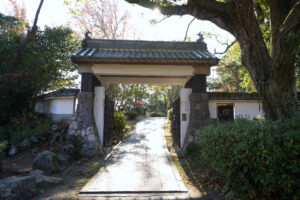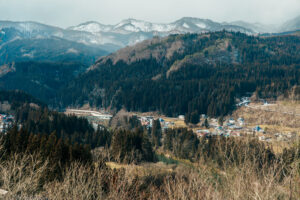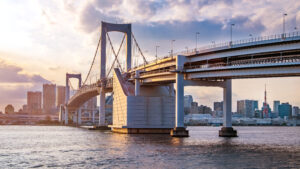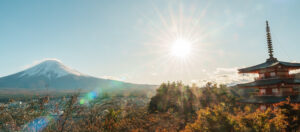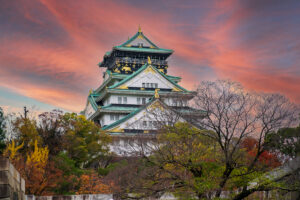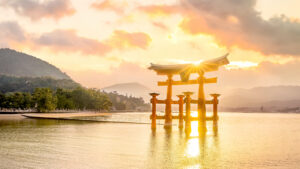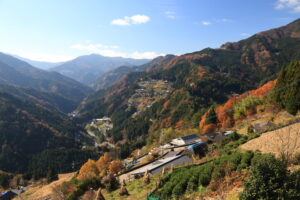Nestled in the Fukushima Prefecture of Japan, Lake Inawashiro is a stunning natural wonder that captivates visitors with its sweeping vistas, rich history, and vibrant ecosystem. Known as the "Lake of the Gods," Inawashiro is Japan’s fourth largest lake, and it offers a myriad of adventures for nature lovers, cultural enthusiasts, and thrill-seekers alike. This article delves deep into the multifaceted allure of Lake Inawashiro, exploring its scenic beauty, ecological significance, local culture, and practical tips to make the most out of your visit.
A Glimpse Into Lake Inawashiro’s Scenic Splendor
Lake Inawashiro boasts breathtaking scenery that draws visitors year-round. Surrounded by majestic mountains, the lake offers a stunning contrast of azure waters against lush greenery and picturesque landscapes. The pristine quality of the water reflects the changing hues of the sky, creating a canvas that transforms with each hour of the day. Visitors are often mesmerized by the tranquil atmosphere that envelops the lake, making it a perfect retreat from the hustle and bustle of city life.
Complementing its natural beauty, the area surrounding Lake Inawashiro is rich in flora and fauna. Wildflowers bloom in spring, creating vibrant patches of color along the shoreline. Fall, on the other hand, introduces a spectacular array of autumn leaves, turning the landscape into a kaleidoscope of reds, oranges, and yellows. Each season reveals a different aspect of the lake’s charm, encouraging visitors to return year after year.
One of the lake’s standout features is Mount Bandai, which looms majestically in the background. This dormant volcano not only enhances the scenic beauty but also offers various hiking trails that provide panoramic views of the lake and its surroundings. The expansive horizons are a photographer’s dream, inviting countless opportunities to capture the essence of this enchanting locale.
The calm waters of Lake Inawashiro are perfect for reflection, both literally and metaphorically. The serene environment invites contemplation and inspiration, making it a favored spot for artists and writers seeking solace in nature’s embrace. As the sun sets over the horizon, the sky is often painted in shades of pink and purple, a daily reminder of nature’s artistry.
Moreover, the lake’s accessibility adds to its allure. With well-maintained paths and viewpoints, visitors can easily explore its scenic vistas, making it an ideal destination for families and outdoor enthusiasts alike. Whether you’re in search of a peaceful escape or an action-packed adventure, Lake Inawashiro caters to every preference.
In summary, Lake Inawashiro’s scenic splendor is not merely a backdrop but a holistic experience that invites everyone to immerse themselves in its beauty, serenity, and artistic inspirations.
Historical Significance: Lake Inawashiro Through the Ages
Lake Inawashiro holds a significant place in Japanese history, with roots that trace back to ancient mythology and local folklore. The lake is often associated with the gods and is believed to be a sacred site, making it a vital part of the region’s cultural heritage. Local legends speak of deities who bestowed blessings upon the lake, and even today, many visitors pay homage to its spiritual essence.
Historically, the area surrounding Lake Inawashiro has been inhabited for thousands of years. Archaeological findings indicate that the lake was a crucial resource for early inhabitants who relied on its waters for sustenance and trade. The lake’s abundant fish and rich biodiversity also played an essential role in the livelihood of the local population.
The Meiji Restoration in the late 19th century marked a turning point for Lake Inawashiro as it transitioned from a secluded natural landscape into a more accessible destination for tourism. This era saw the construction of various amenities and infrastructure, enabling travelers to appreciate its beauty. Consequently, the lake began to attract both domestic and international visitors who were keen to explore its natural wonders.
In addition to tourism, Lake Inawashiro has served as a strategic location during various historical conflicts. It was often a point of interest in regional disputes, and its waters were utilized for transportation and communication among communities. These historical events have left an indelible mark on the cultural fabric of the area, enriching the stories of the lake.
Moreover, the region’s resilience is highlighted by the recovery efforts following the 2011 Fukushima disaster. The lake became a symbol of hope and renewal, as local communities rallied to restore its natural beauty and promote sustainable tourism. This ongoing commitment to conservation reflects the deep-rooted connection between the inhabitants and the lake.
In essence, Lake Inawashiro is not just a picturesque destination; it embodies centuries of history, spirituality, and resilience that make it a significant site in Japan’s cultural landscape.
Ecological Importance: A Biodiversity Hotspot in Japan
Lake Inawashiro is recognized as a vital ecological sanctuary, harboring a diverse range of species that contribute to its rich biodiversity. The lake is home to various fish species, including the indigenous Inawashiro sweetfish, which thrive in its pristine waters. This ecosystem is crucial for the health of the aquatic environment and plays a larger role in the regional food web.
Beyond aquatic life, the surrounding wetlands and forested areas provide habitats for numerous bird species, making the lake a popular destination for birdwatchers. Migratory birds flock to the area, attracted by its abundant food sources and safe nesting sites. This biodiversity attracts researchers and conservationists who study the interrelationships between species and their environments.
The lake’s ecology is also significant for its role in maintaining the region’s water quality. The natural filtration processes of the wetlands help purify the water, supporting both wildlife and human populations. The delicate balance of this ecosystem is essential for sustaining the local flora and fauna, making conservation efforts all the more critical.
In recent years, environmental challenges such as pollution and climate change have threatened the ecological integrity of Lake Inawashiro. Local authorities and environmental organizations have joined forces to implement conservation initiatives aimed at preserving the lake’s biodiversity and promoting sustainable practices. These collaborative efforts include monitoring water quality, restoring habitats, and educating the public about the importance of protecting this natural treasure.
Research studies conducted around Lake Inawashiro emphasize the importance of preserving its delicate ecosystem. Scientific assessments reveal how changes in water temperature, invasive species, and human activities can disrupt this fragile balance. Continuous monitoring is essential to understanding these dynamics and implementing effective conservation strategies.
In summary, Lake Inawashiro serves as a biodiversity hotspot that not only supports a rich array of wildlife but also plays a critical role in maintaining the ecological health of the region. The ongoing efforts to protect and preserve this unique ecosystem highlight its significance in Japan’s natural heritage.
Activities to Experience: From Boating to Birdwatching
Lake Inawashiro offers a plethora of recreational activities that cater to a wide range of interests, making it an ideal destination for adventurers and families alike. One of the most popular activities is boating, with various rental services available along the shoreline. Visitors can choose from rowboats, paddleboats, or even kayaks, allowing them to explore the lake at their own pace while soaking in the surrounding beauty.
Fishing enthusiasts will find delight in the lake’s rich aquatic life. Anglers can expect a good catch, particularly during the warmer months when fish are more active. Local regulations ensure sustainable fishing practices, contributing to the long-term health of the lake’s ecosystem while allowing visitors to enjoy their sport.
For those who prefer to stay on land, hiking and walking trails abound in the region. The paths vary in difficulty, catering to both casual walkers and seasoned hikers. The trails often lead to stunning viewpoints where visitors can marvel at the breathtaking panoramic views of the lake and surrounding mountains. Guided tours are also available for those who wish to delve deeper into the area’s natural and cultural history.
Birdwatching is another rewarding activity at Lake Inawashiro. With its diverse habitats, the area attracts a wide variety of birds, making it a paradise for birdwatchers. Seasonal migration brings unique species, and visitors can often spot herons, ducks, and even the rare Japanese crane. Birdwatching tours are available, providing expert guidance on the best spots and techniques to observe these magnificent creatures.
In winter, the lake transforms into a wonderland for snow sports. Visitors can partake in activities such as skiing, snowboarding, and ice fishing. The frosty landscape offers a different perspective of the lake’s beauty, with the snow-capped mountains providing a stunning backdrop.
Furthermore, for those interested in relaxation, the lakeside is dotted with parks and picnic areas perfect for unwinding. Families can enjoy a leisurely afternoon with a picnic while taking in the tranquil ambiance. The combination of outdoor activities and serene moments make Lake Inawashiro a well-rounded destination for anyone seeking adventure or contemplation.
The Best Seasons to Visit Lake Inawashiro: A Year-Round Gem
Lake Inawashiro is a year-round destination, with each season offering its unique charm and activities. Spring is particularly enchanting, as cherry blossoms bloom around the lake, creating a picturesque setting. The mild temperatures and vibrant landscapes make it an excellent time for outdoor activities such as hiking and boating. Spring festivals often celebrate the cherry blossom season, bringing together locals and visitors in joyous festivities.
As summer arrives, the lake becomes a hub of activity. Warm weather draws visitors for water sports, fishing, and camping. The long, sunny days provide ample opportunities for exploration and leisure. Families flock to the lakeside to enjoy picnics, while children delight in swimming and other water activities. Summer music festivals and cultural events further enrich the experience, creating a lively atmosphere.
Autumn transforms Lake Inawashiro into a canvas of fiery colors. The changing leaves create a stunning backdrop for hiking and photography, with trails leading to spectacular viewpoints. The region celebrates the harvest season with various festivals, showcasing local produce and traditional crafts. The cool, crisp air is invigorating, making it a perfect time for outdoor exploration.
Winter offers a magical experience, with snow blanketing the landscape. The lake often freezes over, creating opportunities for ice fishing and winter sports. The serene beauty of the snow-covered mountains and the frozen lake is a sight to behold. Seasonal winter festivals, complete with illuminations and local cuisine, attract visitors who want to experience the charm of the colder months.
Each season also provides unique wildlife observing opportunities. In spring, migratory birds return, while summer brings active fish and insects. Autumn showcases vibrant fall foliage, and winter reveals the beauty of frost-covered landscapes. This dynamic diversity draws both nature enthusiasts and casual visitors alike, eager to experience the lake’s changing beauty.
Ultimately, the best season to visit Lake Inawashiro depends on individual preferences and interests. Whether it’s the blooming cherry blossoms of spring, the lively summer activities, the breathtaking fall colors, or the pristine winter landscapes, each season offers something special to behold.
Local Culture: Festivals and Traditions Around the Lake
The cultural tapestry surrounding Lake Inawashiro is rich with traditions and festivities that celebrate the area’s natural beauty and historical significance. One of the most notable events is the Inawashiro Lake Fireworks Festival, held every summer. This event features a dazzling display of fireworks illuminating the night sky above the lake, drawing thousands of spectators who gather to witness the breathtaking spectacle. The occasion is often accompanied by food stalls offering local delicacies, creating a vibrant atmosphere.
In addition to the fireworks festival, the area celebrates numerous seasonal festivals that highlight local customs and heritage. The annual Hanami (flower viewing) festival in spring attracts visitors eager to witness the cherry blossoms in full bloom. This event often includes traditional performances, art displays, and opportunities for visitors to enjoy picnics beneath the blossoming trees.
Autumn brings the Harvest Festival, where locals showcase their agricultural products, including rice, fruits, and vegetables. This event fosters a sense of community and encourages visitors to engage with the local culture. Traditional performances, crafts, and games are part of the festivities, providing a glimpse into the region’s rich agricultural heritage.
Historical traditions also play a significant role in the culture surrounding Lake Inawashiro. The local Aizu region has a deep-rooted samurai history, with various sites and stories that reflect this heritage. Visitors can explore traditional samurai residences and museums that offer a window into the lives of these warriors. Guided tours often provide fascinating insights into the region’s past, including its conflicts and cultural practices.
Craftsmanship is another vital aspect of local culture. The region is known for its traditional crafts, including pottery, textiles, and lacquerware. Visitors can participate in workshops to learn these crafts firsthand, gaining an appreciation for the skill and artistry behind them. This hands-on experience fosters a deeper connection between visitors and the local culture.
Additionally, religious festivals throughout the year honor the spiritual significance of Lake Inawashiro. Shrines and temples near the lake host rituals and ceremonies that pay homage to the deities believed to inhabit the area. These events attract both locals and tourists, offering a glimpse into the spiritual traditions that intertwine with the lake’s historical narrative.
In conclusion, the cultural landscape around Lake Inawashiro is vibrant and diverse, offering visitors a rich tapestry of festivals and traditions that celebrate the beauty of nature and the heritage of the region.
Culinary Delights: Tasting the Flavors of Inawashiro
The culinary scene around Lake Inawashiro is a delightful exploration of local flavors and traditional Japanese cuisine. The region is famous for its fresh ingredients sourced from the lake and surrounding farmland, making it a gastronomic haven for food lovers. Local restaurants and eateries showcase seasonal dishes that highlight the freshest produce, fish, and meats available.
One of the must-try dishes is the Inawashiro sweetfish, a local delicacy known for its exquisite flavor and tender texture. Often grilled or served in traditional sashimi style, this fish embodies the essence of the lake’s culinary offerings. Visitors can sample this delicacy at various restaurants along the lakeside, where chefs take pride in preparing dishes that honor local traditions.
In addition to fish, the area is known for its rice cultivation, with Aizu rice being particularly renowned for its quality. Many dining establishments incorporate this staple into their menus, serving it alongside a variety of side dishes that showcase regional vegetables and flavors. The pairing of rice with seasonal ingredients creates a harmonious dining experience that reflects the agricultural bounty of the region.
Street food is another exciting aspect of the local culinary scene. Food stalls at festivals and markets offer an array of mouthwatering snacks, including yakitori (grilled chicken skewers), takoyaki (octopus balls), and sweet treats like taiyaki (fish-shaped cakes filled with red bean paste). These quick bites provide an authentic taste of Japanese street food culture while allowing visitors to explore the flavors of the region.
Moreover, local sake breweries in the Aizu region produce high-quality sake that is celebrated throughout Japan. Visitors can take tours of these breweries to learn about the sake-making process and participate in tastings. Sake pairs wonderfully with local dishes, enhancing the overall culinary experience and allowing visitors to savor the rich heritage of Japanese brewing.
For those with a sweet tooth, the area is also known for its traditional confections. Seasonal sweets made from local ingredients are popular among residents and visitors alike. These desserts often reflect the changing seasons, providing a delightful way to experience the flavors of Inawashiro.
In essence, the culinary delights around Lake Inawashiro offer a tantalizing journey through local flavors, traditional dishes, and innovative fusions that cater to every palate. Exploring the region’s gastronomy is an integral part of the overall experience for anyone visiting this enchanting destination.
Accessing the Lake: Transportation Tips for Travelers
Getting to Lake Inawashiro is an accessible journey, thanks to a well-connected transportation network. The lake is located approximately 30 kilometers from Fukushima City, making it an easy day trip for those staying in the area. Visitors can reach the lake by car, with the journey taking around 40 minutes on the expressway. Ample parking facilities are available near major attractions, allowing for convenient exploration.
For travelers using public transportation, the most efficient option is to take the shinkansen (bullet train) to Inawashiro Station. This journey offers a comfortable and scenic experience, with the opportunity to relax and enjoy the beautiful landscapes along the way. From Inawashiro Station, local buses operate regularly to the lake, providing easy access to various recreational areas and visitor centers.
Once at the lake, getting around is straightforward due to the well-maintained pathways and bike rental options available. Cycling around the lake is a popular activity, allowing visitors to enjoy the stunning scenery while exploring the shoreline at a leisurely pace. Several bike rental shops offer a range of bicycles for all ages, making it a fun and eco-friendly way to navigate the area.
For those who prefer guided experiences, various tour companies offer packages that include transportation, meals, and guided adventures around Lake Inawashiro. These tours often cater to specific interests, such as birdwatching, hiking, or culinary experiences, providing visitors with a comprehensive understanding of the area.
Additionally, travelers should consider purchasing a local transportation pass, which can offer discounts on bus fares and entry fees to attractions. This pass is particularly useful for those planning to explore multiple sites around the lake or participate in various activities throughout their visit.
In summary, accessing Lake Inawashiro is convenient and well-organized, whether traveling by car or public transport. With various options to suit different preferences, visitors can easily embark on an adventure to experience the natural beauty and cultural richness of this remarkable destination.
Accommodations and Stay: Where to Rest Near the Lake
A range of accommodation options near Lake Inawashiro caters to diverse budgets and preferences, ensuring visitors have a comfortable place to rest after a day of exploration. From luxury hotels to cozy guesthouses, the area provides ample choices for every traveler.
For those seeking a luxurious experience, several hotels offer stunning views of the lake and mountains. Many of these establishments feature onsen (hot spring) facilities, providing guests with a relaxing way to unwind while enjoying the natural beauty of the surroundings. These hotels often emphasize local cuisine, serving delectable meals made from fresh, regional ingredients.
Mid-range options include family-friendly hotels and ryokans (traditional Japanese inns) that offer a blend of comfort and local charm. Guests can experience traditional tatami rooms, futon bedding, and the warm hospitality characteristic of Japanese culture. Many ryokans also serve breakfast and dinner featuring seasonal dishes, showcasing the flavors of the region.
For budget travelers, hostels and guesthouses are available within a short distance from the lake. These accommodations provide affordable options without sacrificing comfort. Some hostels also offer communal kitchens, allowing guests to prepare their meals and enjoy a social atmosphere with fellow travelers.
Camping is another popular choice for those who wish to immerse themselves in nature. Several campsites situated around Lake Inawashiro provide facilities for tents and campers, as well as access to clean restrooms and cooking areas. Camping offers a unique opportunity to connect with the natural environment, with the lake’s tranquil waters just steps away.
Booking accommodations in advance is advisable, especially during peak seasons when demand can be high. Many hotels and guesthouses offer online reservations, making it easy for travelers to secure their stay before arrival. Furthermore, some properties offer special packages or promotions, allowing guests to enjoy additional perks or discounts.
In conclusion, the accommodations near Lake Inawashiro cater to a wide range of travelers, ensuring that everyone can find a comfortable place to stay. Whether seeking luxury, tradition, or budget-friendly options, visitors can rest and recharge for their adventures in this breathtaking destination.
Photography Tips: Capturing Lake Inawashiro’s Beauty
Capturing the stunning beauty of Lake Inawashiro through photography requires a blend of preparation, technique, and an appreciation for the natural light and surroundings. As a photographer, it’s essential to plan your visit according to the best times for lighting conditions. Early mornings and late afternoons provide the soft, golden light that enhances landscapes, creating magical visuals.
When

